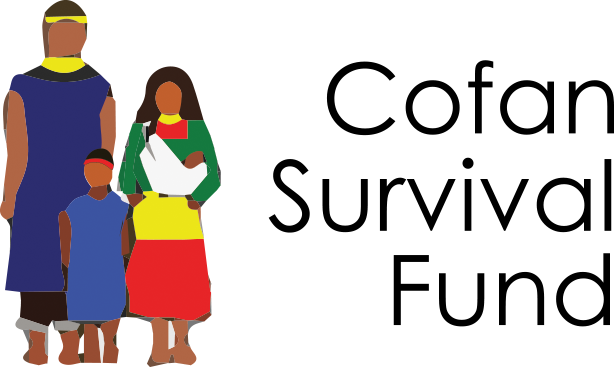I wanted to share with all of you an update about what transpired in 2014. On July 2, 2014 we experienced a major oil spill on the Aguarico River. A 37 year-old pipeline running along the major road near the Cofan village of Dureno broke in the early hours of the morning, and ran unchecked for at least an hour, dumping an estimated 10,000 barrels of petroleum into the nearby stream. By dawn, the Aguarico River was running black with oil.
I was travelling from Quito to the Cofan community of Zabalo that morning when Roberto Aguinda called me. “The pipeline broke at Poca Ttonocho. We are in emergency mode over here.” (Roberto is a long-term board member of the CSF's Ecudador-based sister organization, Fundacion para la Sobrevivenicia del pueblo Cofan "FSC" and currently serves as president of the Cofan Federation.)
When I arrived at the site, the military had buttoned up the access to the spill location and were doing their best to keep people from taking photos. Official reporters were not being allowed in, but it was easy to see the effects on the Poca Ttonocho River as we drove across the bridge. A thick sludge of bubbling crude rode the swift stream, the edges were black with gunk, and the workers were covered in grime from head to toe.
In Dureno, the main Aguarico River channel was heavily marbled with huge streaks and swirls of petroleum, and the air reeked of oil. A canoe full of “reporters” for the government owned TV channels were crossing as we drove up. Their boat was covered in black scum, but they seemed singularly uninterested in the oil spill. One of the reporters had interviewed me several times before, but now climbed into the waiting pick-up truck without even offering me a greeting. The message was clear. Monkey hear no evil, see no evil, say no evil. The next morning, I began a round of meetings with emergency staff people from the national oil company PetroAmazonas. I was joined by fellow leaders of other affected communities and government officials.
Over half of th 40 Cofan families in our Zabalo community depend directly on the river for all water needs other than drinking water, which is collected in rain barrels. The rest have part-time access to stream water; but only when the river is low. We needed to get emergency water to at least twenty of our families immediately and we needed back-up plans to cover the rest of the community. We were not alone in these needs—the rest of the people on the river were facing the same issues.
After some heavy discussion with PetroAmazonas, we were able to get a promise to supply funding, gasoline, barrels and a pump so we could canoe to clean water sources, fill up barrels with water and distribute it. The company also accepted our demand for pumps and tubing to be able to bring water in from clean sources in our pristine forests behind our communities
The next few days, involved meetings and more meetings with officials, politicians, and oil people in neighboring Cuyabeno, Tarapoa, and Lago Agrio.
The most disturbing aspect of this disaster was the total silencing of the press. Especially in the wake of the politics regarding state-sponsored drilling in the Yasuni National Park, it seemed that the government was petrified by the very thought that any information should leak out and re-ignite a popular rejection of the Yasuni oil exploitation.
Thanks to the support of the Cofan Survival Fund, the Cofan have an organized presence and we continued our demands of the oil company. Eventually, the company sent a team to collect oil-contaminated leaves and branches along the river side, and by the middle of August, most of the obvious signs of contamination were pretty much gone. As clean-ups go, it was definitely the best one yet, but ultimately, nature was the real star; naturally-occurring bacteria were the main workers involved.
The Cofan continue to live with this and similar disasters—waters oozing petroleum, inedible fish, and constant work to get fresh water to our people. Luckily, rains were constant and heavy following the spill. We all have rain water systems of one sort or another, and so we survived, as we have countless times before; but the impact remains, with blighted fields, a contaminated well, and with oil once again a noxious substance directly affecting our lives.
